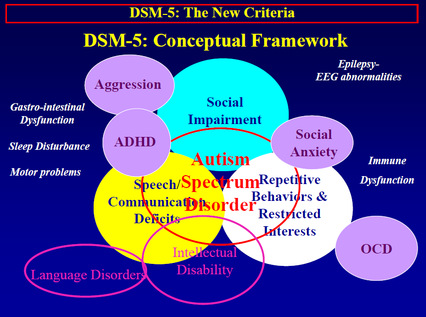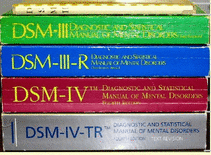What the DSM 5 SaysIn the DSM 5 Autism Spectrum Disorder (ASD) is currently classified as a neurodevelopmental disorder. What does that mean exactly? Here’s what the text of the DSM 5 says, “The neurodevelopmental disorders are a group of conditions with onset in the developmental period. The disorders typically manifest early in development, often before the child enters grade school, and are characterized by developmental deficits that produce impairments of personal, social, academic, or occupational functioning. The range of developmental deficits varies from very specific limitation of learning or control of executive functions to global impairments of social skills or intelligence. The neurodevelopmental disorders frequently co-occur; for example, individuals with autism spectrum disorder often have intellectual disability (intellectual developmental disorder), and many children with attention-deficit/hyperactivity disorder (ADHD) also have a specific learning disorder. For some disorders, the clinical presentation includes symptoms of excess as well as deficits and delays in achieving expected milestones. For example autism spectrum disorder is diagnosed only when the characteristic deficits of social communication are accompanied by excessively repetitive behaviors, restricted interests, and insistence on sameness.” (American Psychiatric Association, 2013) Short Translation The brain works differently, to varying degrees, and everything that the brain manages will also work differently, to varying degrees. These differences show up fairly early in life.
1 Comment
I've been busy researching and writing my first book about autism, Parenting Autism. Please considering supporting my book by donating and/or spreading the word. Thanks!  This graphic come from a presentation on the new DSM 5 diagnostic criteria for autism spectrum disorders prepared by Dr. Walter Kaufmann. I like this graphic of the conceptual framework of ASD because it looks very similar to the way that I have always thought of autism. Different people can inhabit several different spheres to varying degrees but still fall within the spectrum. This is why one autistic person can be so different from another but similar at the same time. So the DSM 5 is finally available to the public. The new diagnostic criteria for Autism Spectrum Disorders presents a bit of problem for researchers but also an opportunity. Previous research using DSM IV criteria will not be comparable to subsequent research using the new DSM 5 criteria. What does this mean for the research community? First, even though the diagnostic criteria in the DSM have changed the diagnostic tools, such as the ADOS and ADI-R, have not. So perhaps the data from studies using the same diagnostic tools can be evaluated using DSM 5 criteria. Second, hopefully previous studies will be replicated using the DSM 5 diagnostic criteria. This should lead to a better understanding of Autism Spectrum Disorders.
A recent New York Times article has stirred up a lot of concern about the coming revisions of the diagnostic criteria listed in the fifth edition of the Diagnostic and Statistical manual (DSM V). Autism specialist Paul Meier shares his comments on the controversy and the upcoming changes in the DSM V.  DSM V proposed revisions I will probably be taking an unpopular position. However, I want to calm some people who are legitimately upset as they are concerned about the well-being of their children, and the children of others, regarding the changes in the DSM-V as they pertain to autism. I do not see anyone getting undiagnosed. I do not see anyone getting services loosing those services. Hopefully I can sufficiently explain this to calm people. There is a critical flaw in the study the NY Times article relied on. They were using 1993 data for the study. In 1993 there was only the DSM-III. Asperger's and PDD-NOS were not even in the DSM. So much more has been learned about autism in the last 19 years using such old data is absurd. 19 years ago they still were not too sure what they were looking for. This would have a huge impact on the data gathered. I am guessing it was all there, but the people recording data didn't know to look for it and therefore could not record it. As someone who is around autism all day every day, and does diagnostic work, I don't think there needs to be fear about the proposed changes to the DSM coming out in 2013. I need to stay on top of all this, and intimately understand all the details and nuances. It is my job. I work with the DSM-IV and I am also familiar with the expected changes in the DSM-V. The proposed changes came out 2 years ago, and were last tweaked a year ago. The only recent change that ignited a firestorm was there was an article in the NY Times January 19, 2012. Autism, Asperger's, and PDD-NOS are all really the same thing. With recognizing that, and understanding it in an everyday clinical sense from professionals, the APA is combining the three into one diagnosis of "Autism Spectrum Disorder". This makes complete and total sense, and I support it 100%. The only question then is does the new diagnostic criteria make sense and work. Part of the problem is that a lot of people do not understand the criteria as they are now, including a lot of professionals. The autism spectrum is not a scale of mild to severe, with the diagnosis you receive depending on the severity of symptoms. Spectrum represents a diversity in individual manifestation of symptoms. By Samantha Pierce
Is Asperger's Overdiagnosed? Recently the above question, posed and supposedly answered in the affirmative in a pair of New York Times opinion editorials, has been making the rounds in public discourse. It is interesting that as awareness of autism spectrum disorders begins to rise the response of the public seems to be that autism spectrum disorders, of which Asperger's is one, are over diagnosed. I would love to see some research to back up such claims. Anecdotes do not equal data as the saying goes. I think this represents a spilling over of a long standing conflict within the autism community. If you spend enough time in any autism related forum you will eventually find two different camps of opinion. There are those who divide the autistic community into the "real" autistics, those who are easily identified as having some sort of impairment (often non-verbal), and the "fake" autistics, those who are able to communicate with the neurotypical world (i.e. they can talk or at least write like they can talk). Then there are those who recognize that the "real" and "fake" autistics fall under the same umbrella if one is willing to take a careful look at how they experience the world. Personally I have children who fall into both of these categories and I see this conflict as a harmful distraction for the autistic community. As different as my children may appear to be to the outside world, upon close examination they have many traits in common. Now that the unsubstantiated claims that there are "real" and "fake" autistic people have hit the mainstream we are beginning to see why this conflict is so harmful in the first place. These unsubstantiated claims of over diagnosis are now being used to marginalize people that many have been fighting to bring into the mainstream. Research into the matter indicates that autism spectrum disorders are likely under diagnosed. Anyone claiming otherwise needs to bring data to the table for rigorous evaluation.  Another article in our series of things NTs say about Autistics. Tikatia Morris is the marketing director at NeuroDiversity Consulting LLC. Learn more here and check out the intro to the series as well as our article on discipline. "But he's so smart!" "Are you sure she isn't just faking it?" "He doesn't look autistic." "Aspergers...that's just a little socially awkward." By: Tikatia Morris In 2008, radio show host, Michael Savage had this to say about autism: "fraud, a racket. ... I'll tell you what autism is. In 99 percent of the cases, it's a brat who hasn't been told to cut the act out. That's what autism is. What do you mean they scream and they're silent? They don't have a father around to tell them, 'Don't act like a moron. You'll get nowhere in life. Stop acting like a putz. Straighten up. Act like a man. Don't sit there crying and screaming, idiot." Here is how one adult with autism described how it feels when a person doesn't believe in the diagnosis: "As if living your whole life incapable of being normal no matter how much effort you put in isn't bad enough, there are people that try to convince you that the condition you're diagnosed with doesn't exist and that you're just a social failure." Autism is, by definition, a spectrum disorder. Individuals with autism have strengths and weaknesses, just the same as their neurotypical counterparts. Some individuals have excellent verbal skills, are sociable, and enjoy being around other people regularly. This does not invalidate their diagnosis. This simply means that they have those skills as a strength. The DSM-IV lists 5 separate diagnoses under the umbrella of Autism Spectrum Disorders. These are: Autistic Disorder, Asperger's Disorder, Pervasive Developmental Disorder Not Otherwise Specified (including Atypical Autism), Rett's Disorder, and Childhood Disintegrative Disorder. Each includes it's own specific diagnostic criteria and each, while under the umbrella of Autism Spectrum Disorder, is unique unto itself as well. Since there are 5 differing disorders under this one umbrella, it wouldn't be much of a stretch to assume that each disorder differs from the others not only in diagnostic criteria, but also in severity of symptoms; hence the term Autism Spectrum Disorder. As a parent, I've often encountered comments like those quoted above from not only neurotypical strangers, friends, and family, but also from professionals such as my son's teachers. When he "perfoms" well in a school setting (mostly due to his overall anxiety from being around that many people) I find myself having to prove his diagnosis to the professionals within that school. They often end up trying to remove services claiming that he doesn't need them even when he's obviously (to me anyway) performing so well because those services are in place. In our personal world, we've come against opposition from friends, and family members alike. The frustration that ensues as a parent having to prove my son's diagnosis is immeasurable, and I'm sure that my son, were he able to explain it, would say that he is not faking his interpretations of his surroundings, nor is he simply misbehaving for the sake of attention or because he's just being a putz, as Savage claims about those on the spectrum. Even parents of autistics can fall prey to disbelief. As Jim Sinclair point out in his essay, “Don’t Mourn for Us”, parents begin on a path of either love and support or rejection the moment of their child’s diagnosis. Sinclair makes the distinction that the source of parents’ grief at an autism diagnosis has, “NOTHING to do with autism, it regards the inability to have the ‘expected relationship’ with their child." When parents continue to misplace this grief onto their child, avowing to wipe this ‘abomination’ off of the face of the earth, they are also stating that their, “greatest wish is that one day [autistics] will cease to be, and strangers you can love will move in behind our faces." When parents finally come to terms with their child's diagnosis, and accept that child for who he or she is, there is still yet another level in our disbelief pyramid. There are then the parents within each group of diagnosis who may have the tendency to belittle another child's diagnosis simply because that child may present the disorder differently from their own child. For example a parent whose child is nonverbal may scoff at a child who is capable of speech that they don't have "real" autism. Parents of children who have these milder versions of autism may feel that they don't fit in with the parents of neurotypical kids, but that they also don't have the support of other parents within the autism community. A major issue regarding autism is a lack of understanding and education, both on the parent and caregiver parts as well as on that of the neurotypical community at large. The changes proposed in the DSM-V may to help alleviate some of the skepticism and misunderstanding of autism spectrum disorders. The proposal is such that those five separate diagnoses will become one single diagnosis of Autism Spectrum Disorder with three distinct levels of severity. There is still a lot of debate within the autism community as to whether this proposition will end with positive results or negative. In conclusion, educate yourself, your families and your communities; and as the saying goes: "When you meet one autistic person, you've met one autistic person." Jon Brock discusses PDD-NOS at Thinking Person's Guide to Autism. Don't know what PDD-NOS is? Read on, even if you think you know what it is you should give this a read.
PDD-NOS and DSM5 Some cases of autism are obvious. Anyone who knew anything about autism would agree that the child or adult in question was autistic. Other cases are less clear cut. Indeed, the term "autism spectrum" implies the existence of a continuum that fades gradually into what we think of as the "normal" population. Somewhere a line has to be drawn and where exactly we choose to draw that line defines what we mean by autism. It determines who is eligible to take part in autism-related research and this in turn influences the development of theories of autism. Eventually, this feeds back to our evolving definitions and cut-offs for autism. Most importantly when it comes to immediate real-world consequences, the diagnostic boundaries specify who is labeled "autistic" and, ultimately, who gains access to interventions and support. In the absence of reliable biological markers or break points in the continuum, diagnoses are made by checklist. Tick enough boxes and you get a diagnosis of "autistic disorder" or "Asperger's disorder". Tick fewer boxes or the "wrong" combination of boxes and you're not considered autistic. You may, however, qualify for the mysterious diagnosis of PDD-NOS - "Pervasive Developmental Disorder -Not Otherwise Specified". Read more. |
Categories
All
Archives
December 2021
|
Photo from Hayzphotos
 RSS Feed
RSS Feed
